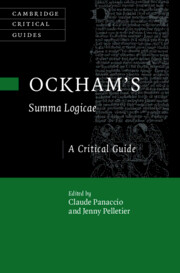Book contents
- Frontmatter
- Contents
- Contributors
- Abbreviations of Ockham’s Works
- Introduction
- Chapter 1 Metaphysical Methodology in Ockham’s Summa Logicae I
- Chapter 2 Ockham and Syncategoremata
- Chapter 3 Ockham on Metalanguage
- Chapter 4 Ockham’s Moderate Modism
- Chapter 5 Relations in Summa Logicae
- Chapter 6 The Threat of Pernicious Ambiguity
- Chapter 7 Ontology and Ockham’s Account of Truth Conditions for Tensed Propositions
- Chapter 8 Ockham’s Theory of the Categorical Syllogism
- Chapter 9 Ockham’s Modal Logic
- Chapter 10 Theory of Demonstration
- Chapter 11 The Obligationes of William of Ockham
- Chapter 12 Ockham on the Liar Paradox
- Chapter 13 Ockham on Figurative Discourse
- Bibliography
- Index
- Cambridge Critical Guides
Chapter 5 - Relations in Summa Logicae
Published online by Cambridge University Press: 04 September 2025
- Frontmatter
- Contents
- Contributors
- Abbreviations of Ockham’s Works
- Introduction
- Chapter 1 Metaphysical Methodology in Ockham’s Summa Logicae I
- Chapter 2 Ockham and Syncategoremata
- Chapter 3 Ockham on Metalanguage
- Chapter 4 Ockham’s Moderate Modism
- Chapter 5 Relations in Summa Logicae
- Chapter 6 The Threat of Pernicious Ambiguity
- Chapter 7 Ontology and Ockham’s Account of Truth Conditions for Tensed Propositions
- Chapter 8 Ockham’s Theory of the Categorical Syllogism
- Chapter 9 Ockham’s Modal Logic
- Chapter 10 Theory of Demonstration
- Chapter 11 The Obligationes of William of Ockham
- Chapter 12 Ockham on the Liar Paradox
- Chapter 13 Ockham on Figurative Discourse
- Bibliography
- Index
- Cambridge Critical Guides
Summary
Ockham’s Summa Logicae treats what modern philosophers would consider philosophy of language and metaphysics, including semantics, Aristotle’s ten categories, and mental language. It is also deeply polemical, especially in Part I (the section covering the notion of a term); hence it is no surprise that his theory of terms supports and defends his parsimonious metaphysics against opponents. Ockham’s view of relational terms in SL is a great example of such a logical theory arising at the crossroads of such issues. Central for Ockham were (1) the ontological implications of relational terms, (2) the question of how they refer, (3) the proper interpretation of Aristotle on relations, and (4) the question of how propositions carrying relational terms should be evaluated by logicians and theologians. After explaining the background ontological controversies mentioned earlier, this chapter exposits Ockham’s main conclusions and most important arguments supporting his favored view of relations.
Keywords
Information
- Type
- Chapter
- Information
- Ockham’s Summa LogicaeA Critical Guide, pp. 105 - 127Publisher: Cambridge University PressPrint publication year: 2025
